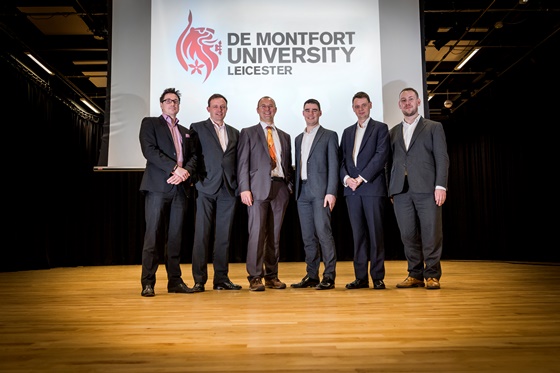Industry giants Airbus Group, Deloitte, BT and Rolls-Royce are lending their skills and experience to help train a new generation of elite cyber security students at De Montfort University Leicester (DMU).
The university has introduced the UK’s first Cyber Technology MSc to be directly supported and steered by four major corporations, breaking new ground in a partnership which can address the country’s skills shortage in cyber security.
This unparalleled industry expertise will ensure students are ready to face the growing threat posed by cyber-attacks in the UK and across the world, which in the past year alone has seen communications giant Talk Talk, Sony Pictures and the Hilton hotel chain all hit by hackers.

Earlier this month Chancellor George Osborne recognized the scale of the threat by announcing he was to double national spending on cyber security to a total of £1.9 billion over the period to 2020.
Dr Helge Janicke, Head of the Cyber Security Centre at DMU, said: “The importance of evolving security techniques and skills is ever more vital in today’s interconnected world. Cyber security is a booming industry with a huge demand for our highly trained graduates.
"At DMU have produced what we believe to be the best cyber security MSc course available anywhere.
“It has been designed and is being delivered in conjunction with some of the biggest firms in the world.
“Their expertise and ongoing support will give students an unmatched grounding in the latest techniques and skills needed, while also giving them a complete social, ethical and legal knowledge context, positioning them as ideal candidates to begin successful careers in a growing industry.”
Staff from BT, Airbus Group, Rolls-Royce and Deloitte will give guest lectures and help deliver modules, while meeting regularly with the Cyber Security Centre at DMU to advise them and help keep the curriculum up to date, keeping students one step ahead of cyber criminals. Students may also have the opportunity to take up placements with the firms.
The course will look beyond the internet and study all aspects of the cyber domain, from protecting the computers that control our buildings to the infrastructure that controls our power stations and water supplies.
Students will study modules within four areas: cyber security, software engineering, digital forensics and management. The flexibility built into the Cyber Technology MSc gives students and employers the ability to tailor the programme to their individual careers and training needs.
Cyber security teaches students tools and techniques to harden computer systems against hacking attempts, along with the importance of data security and associated legal and ethical considerations.
Software engineering modules will lead students through the design, implementation, testing and deployment of bespoke software with emphasis on those used in safety and security critical applications.
The digital forensics modules, meanwhile, include investigating cyber security breaches, presenting findings as an expert witness and implementing effective data protection.
The course is taught in DMU’s renowned Cyber Security and Software Technology Research Laboratories, equipped with high-tech, specially customised PCs and control system equipment.
Dr Kevin Jones, Head of Cyber Operations Research Team, Airbus Group Innovations said: "The world-leading cyber research undertaken by Airbus Group is only made possible by the knowledge and expertise of our research teams.
“We believe that partnerships and collaborations between academia and industry are important to address the UK cyber skills shortage, and ensure that the UK remains a leader and innovator in cyber security for years to come."
Posted on Monday 30 November 2015